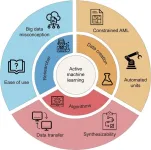(Press-News.org) WASHINGTON, D.C. — The U.S. Department of Energy (DOE) today announced $264 million in funding for 29 projects to develop solutions for the scientific challenges underlying DOE’s Energy Earthshots™ Initiative to advance clean energy technologies within the decade. The funding will support 11 new Energy Earthshot Research Centers led by DOE National Laboratories and 18 university research teams addressing one or more of the Energy Earthshots™ that are focused on six different areas, including industrial decarbonization, carbon storage, and offshore wind. The Department launched the Energy Earthshots Initiative to spur decarbonization efforts that will help the United States meet President Biden’s ambitious climate and clean energy goals, including a 50% reduction in carbon emissions by 2030 and a net-zero carbon economy by 2050.
“Our Energy Earthshots are game-changing endeavors to unleash the technologies of the clean energy transition and make them accessible, affordable, and abundant,” said U.S. Secretary of Energy Jennifer M. Granholm. “The Energy Earthshot Research Centers and the related work happening on college campuses around the country will be instrumental in developing the clean energy and decarbonization solutions we need to establish a 100% clean grid and beat climate change.”
The Energy Earthshots™ connect DOE’s basic science and energy technology offices to accelerate innovations toward more abundant, affordable, and reliable clean energy solutions. These efforts seek to revolutionize many sectors across the United States and will rely on fundamental science and innovative technology to be successful.
The 29 projects were selected by competitive peer review under two DOE solicitations: the National Laboratory Program Announcement for Energy Earthshot Research Centers and the Funding Opportunity Announcement for Science Foundations for Energy Earthshots. Both solicitations covered the first six Energy Earthshots: Carbon Negative Shot™, Enhanced Geothermal Shot™, Floating Offshore Wind Shot™, Hydrogen Shot™, Industrial Heat Shot™, and Long Duration Storage Shot™. Since then, DOE announced a seventh: the Clean Fuels & Products Shot™.
Science Foundations for Energy Earthshots™
DOE’s Office of Science awarded a combined $69.1 million to researchers at 18 different universities across 14 states that will, for example, investigate hydrogen arc plasmas to make steelmaking carbon-free and how to make clean energy systems more resilient using exascale computer simulations and observations.
Arizona State University, Tempe, Arizona
California Institute of Technology, Pasadena, California
Georgia Institute of Technology, Atlanta, Georgia
Georgia State University, Atlanta, Georgia
New York University, New York, New York
The Ohio State University, Columbus, Ohio
University of California, Los Angeles, Los Angeles, California
University of California, Santa Cruz, Santa Cruz, California
University of Florida, Gainesville, Florida
University of Hawaiʻi at Mānoa, Honolulu, Hawaii
University of Illinois Chicago, Chicago, Illinois
University of Illinois Urbana-Champaign, Champaign, Illinois
University of Minnesota Twin Cities, Minneapolis, Minnesota
University of Nevada, Reno, Reno, Nevada
University of Pennsylvania, Philadelphia, Pennsylvania
The University of Texas at El Paso, El Paso, Texas
Washington University in St. Louis, St. Louis, Missouri
Yale University, New Haven, Connecticut
Energy Earthshot Research Centers
The Energy Earthshot Research Centers will support multi-institutional, multi-disciplinary teams addressing key basic research challenges relevant to the Energy Earthshots. The centers will be housed at eight DOE National Laboratories and will receive a combined $195 million across four years.
Argonne National Laboratory, Lemont, Illinois
C-STEEL: Center for Steel Electrification by Electrosynthesis
Brookhaven National Laboratory, Upton, New York
C4M: Center for Coupled Chemo-Mechanics of Cementitious Composites for EGS
Lawrence Berkeley National Laboratory, Berkeley, California
CIWE: Center for Ionomer-based Water Electrolysis
RESTOR-C: RESTORation of Soil Carbon by Precision Biological Strategies
Lawrence Livermore National Laboratory, Livermore, California
Terraforming Soil EERC: Accelerating Soil-Based Carbon Drawdown Through Advanced Genomics and Geochemistry
National Renewable Energy Laboratory, Golden, Colorado
DEGREES: Degradation Reactions in Electrothermal Energy Storage
FLOWMAS: Floating Offshore Wind Modeling and Simulation
Oak Ridge National Laboratory, Oak Ridge, Tennessee
NEETER: Non-Equilibrium Energy Transfer for Efficient Reactions
Pacific Northwest National Laboratory, Richland, Washington
ACE-FWICC: Addressing Challenges in Energy: Floating Wind in a Changing Climate
CUSSP: Center for Understanding Subsurface Signals and Permeability
Princeton Plasma Physics Laboratory, Princeton, New Jersey
PEHPr: Center for the Science of Plasma-Enhanced Hydrogen Production
Total funding is $264 million for projects lasting up to 4 years in duration, with $100 million in Fiscal Year 2023 dollars and outyear funding contingent on congressional appropriations. The list of projects and more information can be found on the Office of Science Energy Earthshot initiative homepage.
Selection for award negotiations is not a commitment by DOE to issue an award or provide funding. Before funding is issued, DOE and the applicants will undergo a negotiation process, and DOE may cancel negotiations and rescind the selection for any reason during that time.
END
DOE announces $264 million for basic research in support of Energy Earthshots™
11 new national lab-led Energy Earthshot research centers and 18 university projects will address tough scientific challenges to help achieve net-zero carbon by 2050, solve climate crisis
2023-09-29
ELSE PRESS RELEASES FROM THIS DATE:
New drug a breakthrough for brain tumor that strikes young people: NEJM editorial
2023-09-29
A top UVA Health cancer expert is highlighting how a new drug could transform how doctors treat a brain tumor that typically strikes younger people.
David Schiff, MD, the co-director of UVA Cancer Center’s Neuro-Oncology Center, has authored an editorial in the prestigious New England Journal of Medicine describing the potential significance of the drug vorasidenib for patients with tumors known as “grade 2 IDH-mutant gliomas.” The drug, when tested in the INDIGO clinical trial, was found to slow tumor growth significantly and extended the average time until the tumor started growing from 11.1 months ...
Genome study reveals 30 years of Darwin’s finch evolution
2023-09-29
An international team of researchers has released a landmark study on contemporary evolutionary change in natural populations. Their study uses one of the largest genomic datasets ever produced for animals in their natural environment, comprising nearly 4,000 Darwin’s finches. The study has revealed the genetic basis of adaptation in this iconic group. The results are published in the journal Science.
Ever since Darwin wrote about the finches of the Galápagos Islands, biologists have studied these small songbirds to understand the mechanisms of evolution. One ancestral species has evolved into 18 different species in the last million years. ...
Ghent University’s research team envisions a bright future with active machine learning in chemical engineering
2023-09-29
Chemical engineering researchers have a powerful new tool at their disposal: active machine learning. In a recent perspective article published in Engineering, Kevin M. Van Geem’s research team at Ghent University explores the potential of active machine learning in revolutionizing the field of chemical engineering. By combining machine learning with the design of experiments, active machine learning promises to enhance the efficiency and cost-effectiveness of research, spanning all length scales of chemical engineering.
Active machine learning algorithms ...
Climate change and carnivores: shifts in the distribution and effectiveness of protected areas in the Amazon
2023-09-29
A new article published in PeerJ Life & Environment, authored by Camila Ferreira Leão at Universidade Federal do Pará sheds light on the effects of climate change on carnivorous mammals in the Amazon and their representation within Protected Areas (PAs). "Climate change and carnivores: shifts in the distribution and effectiveness of protected areas in the Amazon," reveals alarming findings about the vulnerable status of these animals and the effectiveness of conservation measures.
Carnivorous ...
Can ChatGPT help us form personal narratives?
2023-09-29
Research has shown that personal narratives—the stories we tell ourselves about our lives—can play a critical role in identity and help us make sense of the past and present. Research has also shown that by helping people reinterpret narratives, therapists can guide patients toward healthier thoughts and behaviors.
Now, researchers from the Positive Psychology Center at the University of Pennsylvania have tested the ability of ChatGPT-4 to generate individualized personal narratives based on stream-of-consciousness thoughts and demographic details ...
An intelligent control method reduces carbon emissions in energy-intensive equipment
2023-09-29
A research team led by Professor Tianyou Chai from Northeastern University, China, has developed an innovative intelligent control method for the low-carbon operation of energy-intensive equipment. This groundbreaking research, published in the journal Engineering, presents a significant step towards reducing carbon emissions in the process industry.
The research team’s method combines mechanism analysis with deep learning, linking control and optimization with prediction, and integrating decision-making ...
Groundbreaking control method reduces carbon emissions from zinc oxide rotary kilns, boosting profits for zinc smelting industry
2023-09-29
A research team from Central South University in China develops innovative control method to reduce carbon emissions from zinc oxide rotary kilns.
The zinc smelting industry is facing new challenges in meeting China’s carbon peak and carbon neutrality targets. To address these challenges, researchers from Central South University in China have developed a groundbreaking control method that reduces carbon emissions from zinc oxide rotary kilns while maintaining high profits. Their findings have been published in the journal Engineering.
Zinc oxide rotary kilns play a crucial role in the zinc smelting process. ...
Small but mighty new gene editor
2023-09-29
A new CRISPR-based gene-editing tool has been developed which could lead to better treatments for patients with genetic disorders. The tool is an enzyme, AsCas12f, which has been modified to offer the same effectiveness but at one-third the size of the Cas9 enzyme commonly used for gene editing. The compact size means that more of it can be packed into carrier viruses and delivered into living cells, making it more efficient. Researchers created a library of possible AsCas12f mutations and then combined selected ones to engineer an AsCas12f ...
Study finds SARS-CoV-2-associated sepsis was more common, deadly than previously thought
2023-09-29
Using data from Mass General Brigham’s electronic health records, Brigham researchers quantified the burden of SARS-CoV-2-associated sepsis early in the pandemic
New research suggests that the virus responsible for COVID-19 was a more common and deadly cause of sepsis during the initial period of the pandemic than previously assumed. The study, led by investigators from Brigham and Women’s Hospital, a founding member of the Mass General Brigham healthcare system, used electronic health record (EHR) data from five Mass General Brigham hospitals to track the rate of SARS-CoV-2-associated ...
Use of electronic clinical data to track incidence and mortality for SARS-CoV-2–associated sepsis
2023-09-29
About The Study: The results of this study of 431,000 inpatient encounters at five Massachusetts hospitals suggest that SARS-CoV-2–associated sepsis was common and had higher mortality than presumed bacterial sepsis early in the COVID-19 pandemic. These findings highlight the high burden of SARS-CoV-2–associated sepsis and demonstrate the utility of electronic health record-based algorithms to conduct surveillance for viral and bacterial sepsis.
Authors: Claire N. Shappell, M.D., M.P.H., of Brigham and Women’s Hospital in Boston, is the corresponding author.
To access the embargoed ...
LAST 30 PRESS RELEASES:
The unprecedented transformation in energy: The Third Energy Revolution toward carbon neutrality
Building on the far side: AI analysis suggests sturdier foundation for future lunar bases
Far-field superresolution imaging via k-space superoscillation
10 Years, 70% shift: Wastewater upgrades quietly transform river microbiomes
Why does chronic back pain make everyday sounds feel harsher? Brain imaging study points to a treatable cause
Video messaging effectiveness depends on quality of streaming experience, research shows
Introducing the “bloom” cycle, or why plants are not stupid
The Lancet Oncology: Breast cancer remains the most common cancer among women worldwide, with annual cases expected to reach over 3.5 million by 2050
Improve education and transitional support for autistic people to prevent death by suicide, say experts
GLP-1 drugs like Ozempic could cut risk of major heart complications after heart attack, study finds
Study finds Earth may have twice as many vertebrate species as previously thought
NYU Langone orthopedic surgeons present latest clinical findings and research at AAOS 2026
New journal highlights how artificial intelligence can help solve global environmental crises
Study identifies three diverging global AI pathways shaping the future of technology and governance
Machine learning advances non targeted detection of environmental pollutants
ACP advises all adults 75 or older get a protein subunit RSV vaccine
New study finds earliest evidence of big land predators hunting plant-eaters
Newer groundwater associated with higher risk of Parkinson’s disease
New study identifies growth hormone receptor as possible target to improve lung cancer treatment
Routine helps children adjust to school, but harsh parenting may undo benefits
IEEE honors Pitt’s Fang Peng with medal in power engineering
SwRI and the NPSS Consortium release new version of NPSS® software with improved functionality
Study identifies molecular cause of taste loss after COVID
Accounting for soil saturation enhances atmospheric river flood warnings
The research that got sick veterans treatment
Study finds that on-demand wage access boosts savings and financial engagement for low-wage workers
Antarctica has lost 10 times the size of Greater Los Angeles in ice over 30 years
Scared of spiders? The real horror story is a world without them
New study moves nanomedicine one step closer to better and safer drug delivery
Illinois team tests the costs, benefits of agrivoltaics across the Midwest
[Press-News.org] DOE announces $264 million for basic research in support of Energy Earthshots™11 new national lab-led Energy Earthshot research centers and 18 university projects will address tough scientific challenges to help achieve net-zero carbon by 2050, solve climate crisis





